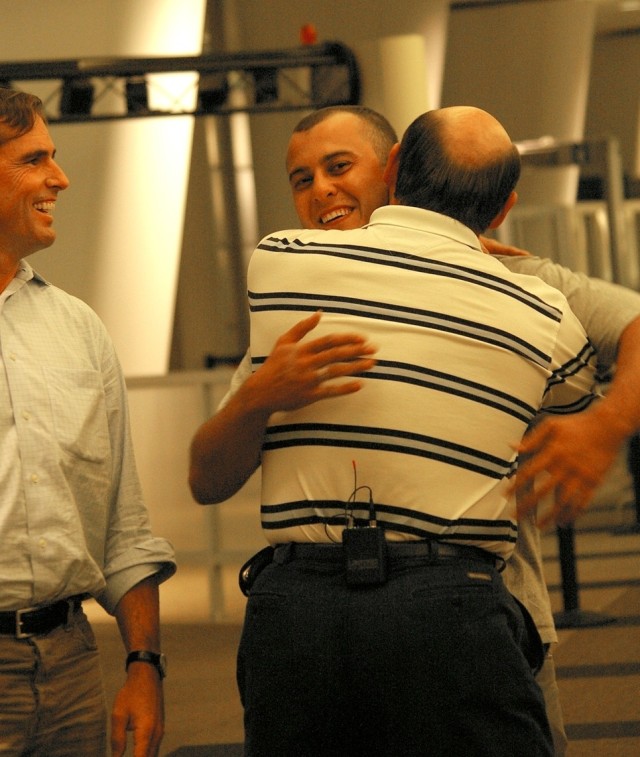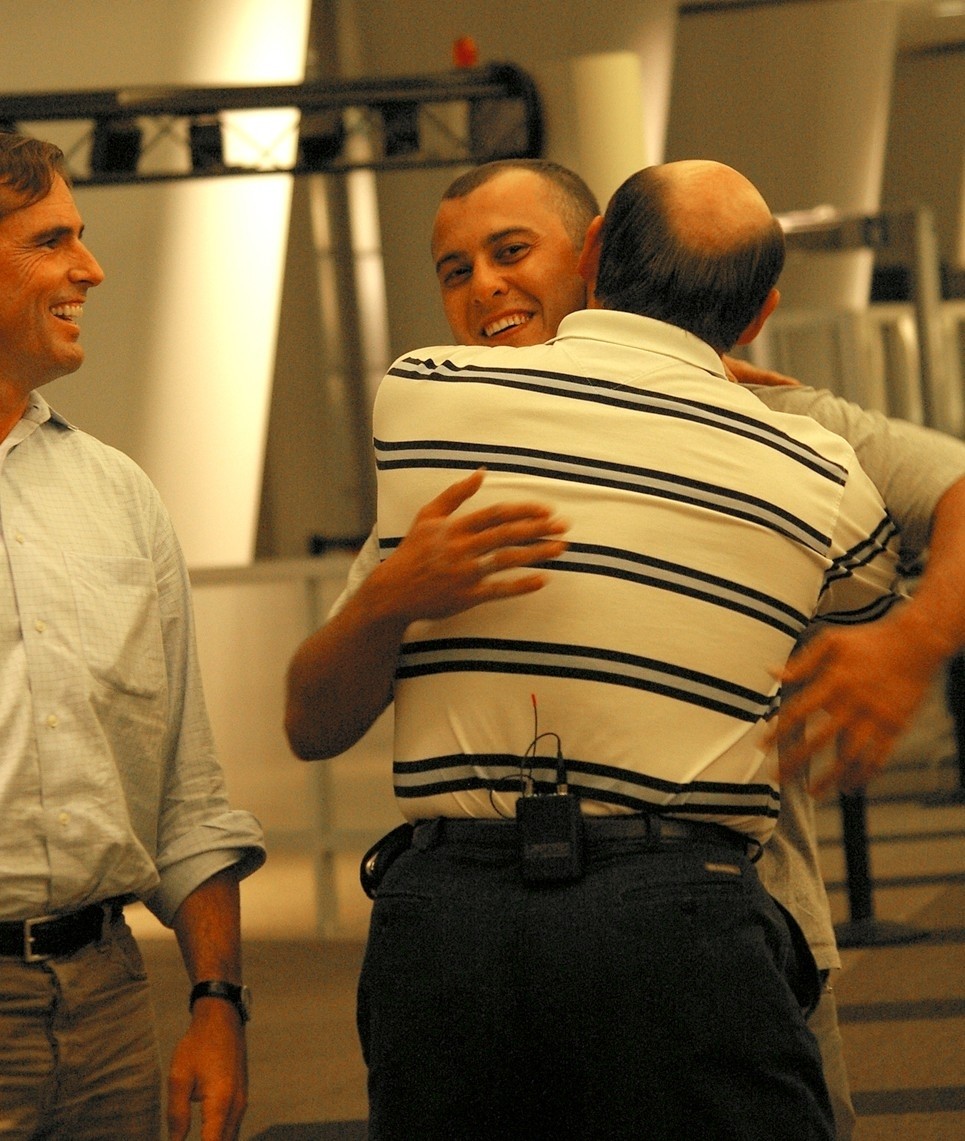FORT KNOX, Ky. (Army News Service, Sept. 19, 2007) - On Jan. 29, 2006, ABC News announced their news anchor Bob Woodruff and cameraman Doug Vogt had been critically injured by a roadside bomb while traveling in Iraq.
Word of the blast's effects spread around the world via satellite broadcasts, and updates on the recoveries of Mr. Vogt and Mr. Woodruff were regular news items for weeks.
Today, 21 months later and recovered from his wounds and back at work, Mr. Woodruff completed another part of his Iraq odyssey last Tuesday at Louisville International Airport when he met up with retired 1st Sgt. John McFarlane who had been traveling with the news team at the time of the explosion.
Mr. Woodruff was hand-delivering a special package to the retired Soldier - Omar - Mr. McFarlane's interpreter and the man credited with helping save Mr. Woodruff's life.
Mr. McFarlane had been named Omar's sponsor as he begins his new life in the U.S., and Mr. Woodruff was a major part of the effort to bring Omar (his last name has been withheld) to the states.
Through a special U.S. program, Iraqi interpreters who are recommended by the U.S. commands they serve may come to the U.S. to live.
There are those, including Mr. McFarlane and the Soldiers with whom he served in Iraq, who believe that the program is the least the U.S can do for the Iraqi men and women who choose to place themselves and their families at risk with terrorists in order to work with the U.S. armed forces.
"When someone like Omar who has helped the military so deeply, allowing them into this country is going to be beneficial to us," Mr. Woodruff explained. "They paid a dear price and want to come and live in the United States."
Mr. McFarlane, who had retired from the Army in 2000 but had been recalled to active duty, met Omar just after arriving in Iraq in 2005. Mr. McFarlane was tasked to be a trainer working with the Iraqi army.
"We lived together in the same building - the interpreter becomes part of you," Mr. McFarlane said. "If you're advising the Iraqi army, you have to be able to talk with the people. The interpreters have to assume part of your persona, and the good ones help you from making social mistakes."
He said he wasn't supposed to go on patrol the day Mr. Woodruff was injured, but at the last minute Mr. Woodruff's group needed extra vehicles so Mr. McFarlane, "stood a crew up to go."
Omar was made aware of the relocation program, but Mr. McFarlane said it wasn't until last year after an assassination attempt on Omar's brother's life, that he decided to leave Iraq.
Omar was an officer candidate in Iraq's air defense school when the ground war began.
"As soon as an American unit showed up in his neighborhood, he went to work for them. He's been in the fight ever since," Mr. McFarlane added.
Omar worked as an interpreter for several units over the last four years, and has been involved in more than 25 blasts from improvised explosive devices.
Despite being wounded three times, Omar's dream has been to come to the U.S., and to join the American Army.
"I have always wanted to come to the United States, but didn't have the chance," Omar said. "Finally, the U.S. government decided to let the interpreters into the U.S....I had my friends, John McFarlane and Bob Woodruff, to help to get me in here by moving my case along on my behalf.
"I do want to join the U.S. Army, but in the beginning I will wait a little to get all my paperwork and immigration papers done, and get to where I can stand on my own feet. Then I can see what my options are," he added.
Omar was among the first people to reach the badly wounded Mr. Woodruff after the IED explosion in 2006. He had been directed to ride with Mr. Woodruff so that the journalist could communicate with Iraqis.
Mr. Woodruff had been riding with his upper body exposed. Mr. McFarlane recalled that Omar pulled Mr. Woodruff back into the vehicle after the blast and immediately cleared his airway, the primary reason why Mr. Woodruff survived.
"I couldn't tell if Bob was alive," Mr. McFarlane recalled. "I thought he was dead...then I got the combat life saver bags, and when I got back, I saw Bob's eyes flutter and I thought, 'We've got something here and I need to get real busy.'"
Busy, it was. From the time of the blast to the time Mr. Woodruff reached Baghdad, about 27 minutes had passed, Mr. McFarlane recalled. And from the time of the blast to the time Mr. Woodruff reached the operating room, 42 minutes had elapsed.
Months later, when Mr. Woodruff returned to work at ABC, he traveled back to Iraq to track down Omar and thank him - even doing a news story on the man who helped save his life.
Omar, Mr. Woodruff, the Soldiers who were at the scene of the explosion, and service members whom Mr. Woodruff met in the hospital, continue to stay in close contact, Mr. McFarlane said.
"Bob has really gone after Omar - I mean, he owes him his life," Mr. McFarlane explained. "Efforts have been underway for about a year to get him over here, and Bob has had a role in all that."
And, Mr. Woodruff added, ABC has had a role in Omar's case as well.
"We were doing everything we could to make sure he was safe in Syria, and that he was getting many people within the U.S. government to look at his case, and I think that has been helpful," Mr. Woodruff said.
But Mr. Woodruff also gives much of the credit to Mr. McFarlane for Omar being in the U.S.
"He has done a lot of the work in getting Omar here, and certainly the fact that they lived so closely together for so many months had something to do with it," Mr. Woodruff said.
He explained that the program allows 50 interpreters a year into the U.S., but only if the commanders they work for recommend them and write letters. Maj. Mike Jason, the commanding U.S. officer training with the Iraqis, had already started the process by writing letters on Omar's behalf and forwarding them through the chain of command.
Omar had left the country without proper paperwork, arrived in Europe, and was deported to Syria. He couldn't go back to Iraq because of the danger to him and his family. There were only two other countries where the U.S. had embassies from which Omar could complete the interview process and the paperwork. One was Jordan, but that country wasn't accepting any more Iraqi refugees at the time. The other was in Turkey, which wasn't permitting anyone from Syria to cross its border.
But Mr. McFarlane continued to work on Omar's behalf. He offered his son's room so Omar would have a place to stay and a U.S. address for all the required visa paperwork. Mr. McFarlane then enlisted the aid of Kentucky U.S. Sen. Jim Bunning.
"I contacted Senator Bunning's office - they have been tremendous in cutting red tape," he said, explaining how Pam Dimmerson, director of constituent services had walked on water for Omar.
"I am so excited for this young man because he is so deserving," said Ms. Dimmerson.
She said she was recently able to e-mail Omar directly to thank him for "helping our Soldiers."
"And then I heard back from him and he said, 'No ma'am, it's my privilege - they are helping my people,'" she said.
(Rachael Tolliver serves as associate editor of the Fort Knox "Turret.")


Social Sharing